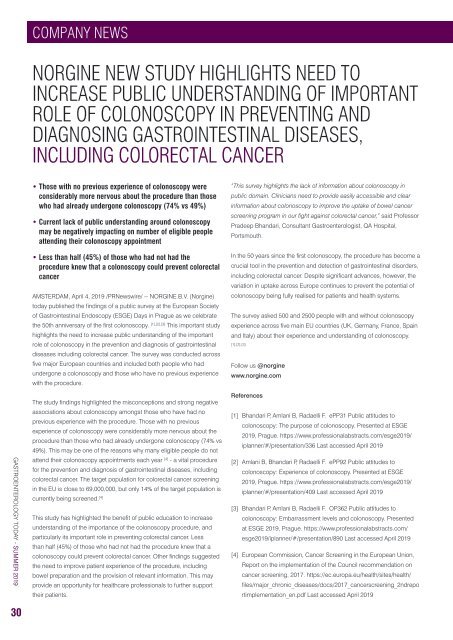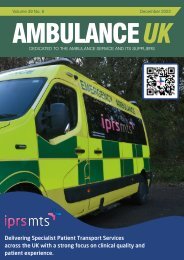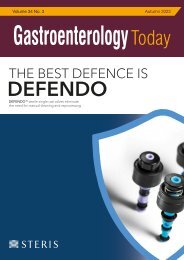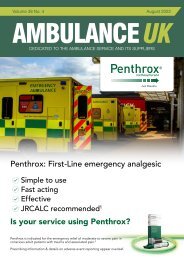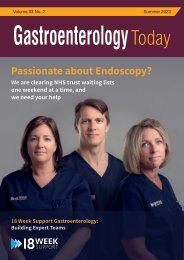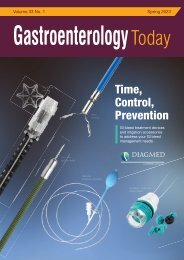Create successful ePaper yourself
Turn your PDF publications into a flip-book with our unique Google optimized e-Paper software.
COMPANY NEWS<br />
NORGINE NEW STUDY HIGHLIGHTS NEED TO<br />
INCREASE PUBLIC UNDERSTANDING OF IMPORTANT<br />
ROLE OF COLONOSCOPY IN PREVENTING AND<br />
DIAGNOSING GASTROINTESTINAL DISEASES,<br />
INCLUDING COLORECTAL CANCER<br />
GASTROENTEROLOGY TODAY - SUMMER <strong>2019</strong><br />
30<br />
• Those with no previous experience of colonoscopy were<br />
considerably more nervous about the procedure than those<br />
who had already undergone colonoscopy (74% vs 49%)<br />
• Current lack of public understanding around colonoscopy<br />
may be negatively impacting on number of eligible people<br />
attending their colonoscopy appointment<br />
• Less than half (45%) of those who had not had the<br />
procedure knew that a colonoscopy could prevent colorectal<br />
cancer<br />
AMSTERDAM, April 4, <strong>2019</strong> /PRNewswire/ -- NORGINE B.V. (Norgine)<br />
today published the findings of a public survey at the European Society<br />
of Gastrointestinal Endoscopy (ESGE) Days in Prague as we celebrate<br />
the 50th anniversary of the first colonoscopy. [1],[2],[3] This important study<br />
highlights the need to increase public understanding of the important<br />
role of colonoscopy in the prevention and diagnosis of gastrointestinal<br />
diseases including colorectal cancer. The survey was conducted across<br />
five major European countries and included both people who had<br />
undergone a colonoscopy and those who have no previous experience<br />
with the procedure.<br />
The study findings highlighted the misconceptions and strong negative<br />
associations about colonoscopy amongst those who have had no<br />
previous experience with the procedure. Those with no previous<br />
experience of colonoscopy were considerably more nervous about the<br />
procedure than those who had already undergone colonoscopy (74% vs<br />
49%). This may be one of the reasons why many eligible people do not<br />
attend their colonoscopy appointments each year [4] - a vital procedure<br />
for the prevention and diagnosis of gastrointestinal diseases, including<br />
colorectal cancer. The target population for colorectal cancer screening<br />
in the EU is close to 69,000,000, but only 14% of the target population is<br />
currently being screened. [4]<br />
This study has highlighted the benefit of public education to increase<br />
understanding of the importance of the colonoscopy procedure, and<br />
particularly its important role in preventing colorectal cancer. Less<br />
than half (45%) of those who had not had the procedure knew that a<br />
colonoscopy could prevent colorectal cancer. Other findings suggested<br />
the need to improve patient experience of the procedure, including<br />
bowel preparation and the provision of relevant information. This may<br />
provide an opportunity for healthcare professionals to further support<br />
their patients.<br />
“This survey highlights the lack of information about colonoscopy in<br />
public domain. Clinicians need to provide easily accessible and clear<br />
information about colonoscopy to improve the uptake of bowel cancer<br />
screening program in our fight against colorectal cancer,” said Professor<br />
Pradeep Bhandari, Consultant Gastroenterologist, QA Hospital,<br />
Portsmouth.<br />
In the 50 years since the first colonoscopy, the procedure has become a<br />
crucial tool in the prevention and detection of gastrointestinal disorders,<br />
including colorectal cancer. Despite significant advances, however, the<br />
variation in uptake across Europe continues to prevent the potential of<br />
colonoscopy being fully realised for patients and health systems.<br />
The survey asked 500 and 2500 people with and without colonoscopy<br />
experience across five main EU countries (UK, Germany, France, Spain<br />
and Italy) about their experience and understanding of colonoscopy.<br />
[1],[2],[3]<br />
Follow us @norgine<br />
www.norgine.com<br />
References<br />
[1] Bhandari P, Amlani B, Radaelli F. ePP31 Public attitudes to<br />
colonoscopy: The purpose of colonoscopy. Presented at ESGE<br />
<strong>2019</strong>, Prague. https://www.professionalabstracts.com/esge<strong>2019</strong>/<br />
iplanner/#/presentation/336 Last accessed April <strong>2019</strong><br />
[2] Amlani B, Bhandari P, Radaelli F. ePP92 Public attitudes to<br />
colonoscopy: Experience of colonoscopy. Presented at ESGE<br />
<strong>2019</strong>, Prague. https://www.professionalabstracts.com/esge<strong>2019</strong>/<br />
iplanner/#/presentation/409 Last accessed April <strong>2019</strong><br />
[3] Bhandari P, Amlani B, Radaelli F. OP362 Public attitudes to<br />
colonoscopy: Embarrassment levels and colonoscopy. Presented<br />
at ESGE <strong>2019</strong>, Prague. https://www.professionalabstracts.com/<br />
esge<strong>2019</strong>/iplanner/#/presentation/890 Last accessed April <strong>2019</strong><br />
[4] European Commission, Cancer Screening in the European Union,<br />
Report on the implementation of the Council recommendation on<br />
cancer screening, 2017. https://ec.europa.eu/health/sites/health/<br />
files/major_chronic_diseases/docs/2017_cancerscreening_2ndrepo<br />
rtimplementation_en.pdf Last accessed April <strong>2019</strong>


